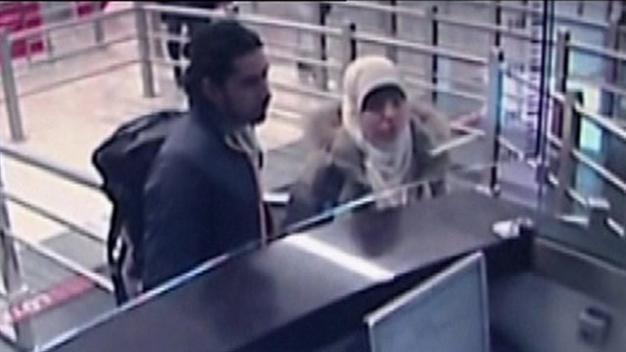Turkey complains of French reluctance in anti-terror cooperation
Deniz Zeyrek ANKARA

Security camera video footage shown on Jan. 12 by the Habertürk TV station shows Boumeddiene arriving at Istanbul’s Sabiha Gökçen airport on Jan. 2, five days before the first terror attack in Paris. A high-ranking Turkish official, who spoke to AP on condition of anonymity, confirmed that the woman in the video was Boumeddiene.
Paris has been reluctant in anti-terrorism cooperation following last week’s deadly attacks in France by militants with international links, according to the Turkish authorities.
The French authorities, which ordered 10,000 troops into the streets Jan. 12 to protect sensitive sites, are hunting for the accomplices of Islamist militants who left 17 people dead in attacks that began on Jan. 7 with a massacre at the satirical newspaper Charlie Hebdo and ended when three attackers were killed on Jan. 9 in simultaneous clashes with security forces around Paris.
It was not clear exactly how many accomplices the French forces are hunting for in addition to Hayat Boumeddiene, the widow of Amedy Coulibaly, the Islamic State of Iraq and the Levant (ISIL) attacker who killed four hostages Jan. 9 at a kosher grocery in Paris before being killed by security forces.
A source told daily Hürriyet that Turkish intelligence searched for Boumeddiene in its own database and immediately notified Paris that the woman had arrived in Turkey on Jan. 2, but French authorities insisted for another eight hours that she was in the kosher grocery as the attack unfolded. France provided Turkey with the cellphone numbers of Boumeddiene only after the eight-hour lag.
With the additional information, Turkish intelligence was able to determine that Boumeddiene checked into an Istanbul hotel with the help of a French citizen before going to Akçakale, a town in the Turkish province of Şanlıurfa on the border with Syria, on Jan. 8.
After identifying the four Turks that she met in Istanbul and Şanlıurfa, Turkish officials think that Boumeddiene ultimately crossed into Syria’s Raqqa province, possibly to the town of Tel Abyad, by illegal means. The ongoing investigation is focused on identifying the person who accompanied Boumeddiene in Turkey.
Sources said Turkish authorities had found France’s anti-terror cooperation “insufficient.” In addition to the delay in the sharing of information, French intelligence failed to provide Turkish authorities with a full list of suspected ISIL militants. France has blacklisted 1,200 suspects, but provided Turkish authorities with only 500 names.
As a result, Boumeddiene’s name was not shared with Ankara beforehand, making it impossible to arrest or track her immediately upon her arrival. Ankara deports any French citizen that Paris divulges on its blacklist, Turkish officials said.
